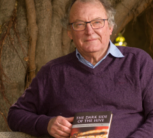Professor André Ganswindt has been involved in research at the University of Pretoria (UP) for the past 15 years, since completing his PhD at the University of Münster in Germany.
He says he chose to do research at a university in South Africa because the country has great potential and easy access to rich fauna, and that he chose UP because it supported his idea of establishing a specialised lab to support his field of expertise. To date, the Endocrine Research Laboratory is the only facility of its kind in Southern Africa. Prof Ganswindt regularly collaborates with colleagues in the Departments of Zoology and Entomology and Animal Science, as well as in the Health and Veterinary Science faculties.
He studies behavioural endocrinology in mammals, reptiles and birds to address questions concerning regulative endocrine mechanisms, which in combination with other factors, like social or ecological changes, influence and control animal behaviour.
Prof Ganswindt and his research group of postgraduate students are developing and validating non-invasive tools for monitoring reproductive function and responses to stressors in captive and free-ranging animals, and interlinking these approaches with studies on animal conservation, climate change, human-wildlife conflict, land transformation and urbanisation. It often leads to a cross-disciplinary approach of physiological-endocrine research, behavioural biology and wildlife ecology to improve the management and welfare of animals in zoological institutions as well as in the wild.
This field of research contributes meaningfully to efforts to conserve wildlife, and in so doing, helps to protect ecological health on Earth. “Research, including mine, does not matter per se,” says Prof Ganswindt. “It only starts to matter if the findings contribute to a better understanding and (social) interaction with ourselves, our peer-group, related society and the world as a whole.”
Prof Ganswindt says his research group has created a collaborative network of locally and globally recognised experts that focus on many aspects of mammal-oriented research, with several opportunities for basic and applied science, professional development, and relevant theoretical and practical training for undergraduate and postgraduate students.
Having a large group of research students, about 10 PhD and 10 MSc students at any given time, means new research projects are continuously being initiated. Prof Ganswindt says a recent highlight was the inclusion of marine mammals in their research portfolio. Another recent PhD project non-invasively assessed trace elements to evaluate African savannah ecosystem health.
The professor’s passion for his field of research stems from his fascination as a young child with the wildlife documentaries produced by Heinz Sielmann and marine conservation pioneer Jacques Cousteau. “I wanted to become a biologist ever since.”
His academic role model is British evolutionary biologist and author Richard Dawkins. “In my opinion, he is an awesome thinker with fantastic discussion skills. Within UP, I would refer to Prof Nigel Bennett as my mentor, as he is not only a brilliant scientist, but also a very kind and supportive colleague.
Prof Ganswindt advises school learners or undergraduates who are interested in his field to follow their heart if they know what they want to do. “Where there is will, there is a way. If you are not exactly sure what you want to do, try to create a list of what you don’t want – it narrows down the path.”
As for recreation, he is interested in philosophy and is a keen CrossFitter.
More from this Researcher
Professor Robin Crewe was born in Johannesburg and studied at the University of Natal in Pietermaritzburg and at the University of Georgia, Athens, Georgia, USA for his PhD. For a period of ten years (1986-1996) he was the Director of the Communication Biology Research Group of the University of the Witwatersrand where a major focus of the group’s work was the study of honeybee chemical communication systems. He established the Social Insects Research Group (SIRG) at the University of Pretoria, which continues with studies of social insects under the direction of Prof Christian Pirk.
He was a Vice-Principal of the University of Pretoria from 2003 until his retirement from this position in June 2013. He is a past president of the Academy of Science of South Africa. His current research is focused on chemical communication and social organisation in honeybees and ants, particularly with respect to worker reproductive regulation.
He is the Chair of the Special Projects Committee of the South African Council for Natural Scientific Professions, Convenor of the APIMONDIA Africa Working Group on Honey Standards and Adulteration, Member of APIMONDIA Working Group on Adulteration of Bee Products.
He is a Fellow of the Royal Entomological Society of London, a Fellow of the Royal Society of South Africa, a Fellow of the World Academy of Sciences, a founding member of the Academy of Science of South Africa, a Fellow of the African Academy of Science, a Foreign Associate of Hassan II Academy of Science and Technology in Morocco and was awarded the Gold Medal of the Zoological Society of South Africa, and honorary life membership of the Entomological Society of Southern Africa. He was awarded the prestigious Harry Oppenheimer Fellowship for 2012 and the ASSAf Gold Medal for meritorious service in 2013. In 2019, he was the winner of the National Science and Technology Forum-South32 Award for a contribution to Science over a lifetime. He is currently a Senior Research Fellow in the Centre for the Advancement of Scholarship at the University of Pretoria.
1. What first got you interested in entomology and bees in particular?
My interest in chemistry and biochemistry when I was a student, attracted me to the study of chemical communication systems in insects that were being explored for the first time when I started doing research. This lead to a life-long fascination with these systems.
2. What is the most fascinating thing about bees that most people don’t know?
Most people don’t realise that social interactions are controlled by a set of chemical signals produced by the queen.
3. With the widespread use of pesticides, there’s been a lot of talk of bees going extinct. What would happen to our world if that were the case?
The outcome is difficult to predict, since if bees were to go extinct then many other insect species would also go extinct with unpredictable consequences for humans. The immediate effect of the loss of honey bees would be a dramatic decline in food production and hence large-scale food shortages that would likely lead to famine.
4. You’ve studied communication among bees for many years as well as their society. What have been some of the key findings over the years?
We have defined the chemical mixtures that make up signals produced by queens and we’ve shown how these chemical signals can also be produced by workers if the social conditions in the colony change. We have explored the way these signals affect the physiology and behaviour of individuals within the colony.
5. Why do you think their society is so similar to ours or why do we see so many parallels between our society and theirs?
Bee societies appear to be well regulated, harmonious and led by a dominant individual. This has the appearance of similarity to autocratic human societies and leads to the feeling that such societies represent a ‘natural order’. However, the differences are striking in that honey bee societies consist almost exclusively of females and the queen, which is the reproductive individual and the large number of workers that are non-reproductive.
6. What do you do in your spare time?
I have become interested in flying quadcopter drones that can be used to study honey bees’ mating behaviour.
7. Do you chase bees away when they get too close to you?
I ignore them since they are unlikely to do anything to you. If you brush them away or swat at them, you stand good chance of being stung.
8. How many times have you been stung by bees?
When working with honey bee colonies, we get stung regularly.
More from this Researcher


 Story
Story
 Story
Story
 Infographic
Infographic
Get Social With Us
Download the UP Mobile App